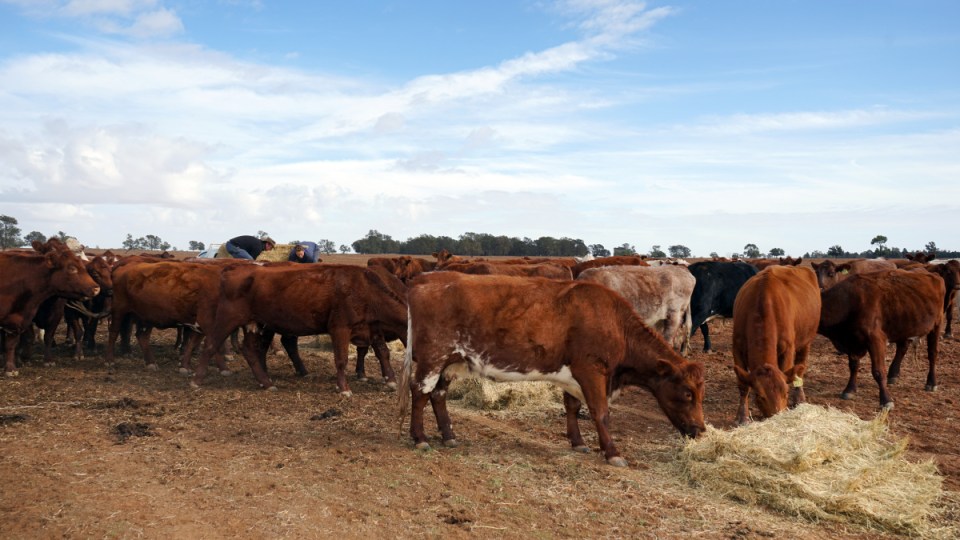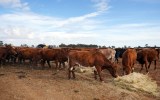


The US is celebrating Australia’s decision to reverse a ban on American beef, and giving President Donald Trump the credit for the change.
The Albanese government on Thursday revealed it would lift biosecurity restrictions on US beef, blindsiding Australian cattle producers.
The federal government had mulled the move for months after the Trump administration imposed tariffs on Australian beef.
Agriculture Minister Julie Collins said the decision to allow US beef into Australia was based on a review of the science around biosecurity.
Australia has allowed US beef into the country since 2019, but it blocks meat from cattle born in Mexico and Canada slaughtered in America.
This effectively barred all beef from the continent because US supply chains are largely integrated. No US beef has been imported since 2019.
US Agriculture Secretary Brooke Rollins hailed the “major trade breakthrough”.
She issued a statement headlined: Make agriculture great again trade wins: President Trump secures greater ag market access to Australia for American beef.
“American farmers and ranchers produce the safest, healthiest beef in the world. It’s absurd that non-scientific trade barriers prevented our beef from being sold to consumers in Australia for the last 20 years,” it said.
“This is yet another example of the kind of market access the President negotiates to bring America into a new golden age of prosperity, with American agriculture leading the way.”
The US National Cattlemen’s Beef Association said it was “pleased that President Trump has successfully opened the Australian market to American beef”.
“We greatly appreciate President Trump delivering another win for America’s family farmers and ranchers.”
However, Australian cattle producers were blindsided by the decision – although the amount of American product arriving in Australia is expected to be very low.
Nationals backbencher Barnaby Joyce questioned the government’s claim that biosecurity would not be compromised.
“The Trade Minister’s not the Chief Veterinary Officer,” Joyce told Sky News.
“Let’s get the Chief Veterinary Officer out to say that.
“I want to hear from the person, I want to see their face and see if they grimace when they give the advice that this is the proper process.”
Cattle Australia CEO Will Evans believed it would not have come unless the government had the utmost confidence in the science, but said some would still be unhappy.
“There’s going to be a lot of people today who feel blindsided by this; there’s going to be a lot of people who are going to feel really frustrated and threatened by this,” he told ABC radio.
“We need to talk to them.
“The US is an incredibly important trading partner – we need to maintain access and we need to maintain relationships with them.”
There are some concerns that imported US beef could hit Australia’s domestic market, although industry representatives remain relatively unperturbed.
“It’s a bit like selling ice to Eskimos,” Australian Meat Industry Council CEO Tim Ryan told the ABC.
The domestic beef industry was self-sufficient and any imports of US beef were “unlikely to have any effect on the market here”, Evans said.
He said the US couldn’t even meet its own needs and remained a key export market for Australian beef.
Likewise, Australian beef is one of the country’s biggest exports to the US, worth $14 billion in 2024.
Despite the figures, Trump has taken issue with the relationship, saying in April, “they won’t take any of our beef”.
The US has been able to send beef to Australia since 2019. However, any beef raised in Canada or Mexico before being slaughtered and processed in the US was previously barred amid biosecurity concerns.
A key worry was that Mexico’s livestock tracking system could inadvertently lead producers to import beef from parts of the continent where there were disease outbreaks.
But the latest announcement will lift the ban on beef sourced from Canada or Mexico after the US introduced more robust movement controls late last year and earlier in 2025, allowing for improved identification and tracing throughout the supply chain.
“We have not compromised on biosecurity,” Collins said in Canberra.
“Australia stands for open and fair trade – our cattle industry has significantly benefited from this.
“[The department] is satisfied the strengthened control measures put in place by the US effectively manage biosecurity risks.”
The change is widely viewed as a bargaining chip for Australia as it pushes for exemptions to Trump’s tariffs.
Nationals Leader David Littleproud said was concerned about the “swiftness” of the change.
“It looks as though it’s been traded away to appease Donald Trump, and that’s what we don’t want,” he told ABC radio.
Opposition trade spokesman Kevin Hogan said more questions needed to be answered and maintained the government needed to ensure biosecurity protocols had not been weakened.
Collins insisted the decision was part of a years-long science-based process that preceded US tariffs.
Many Australian goods sent to the US face the baseline 10 per cent tariff, while steel and aluminium products have been slapped with a 50 per cent tariff.
Trump has also threatened a tariff on pharmaceutical imports to the US, which is one of Australia’s biggest exports to its ally.
-with AAP










